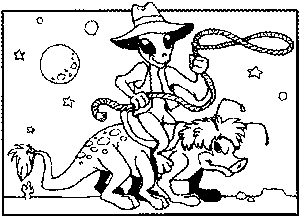Space: The Funky Frontier

Audience
This lesson is designed for campers who are at about a middle school reading level and who can find and follow the directions and links in a Web site. The Web pages used in the lesson include information that is appropriate for this audience, as well as for more advanced students.
Objectives
By the time your campers have finished this lesson, they should be able to name the nine planets in order and to state specific information about Uranus. The activities described in the worksheet will encourage them to do some creative writing and think about celestial bodies and how they are named.
Web Site
The Nine Planets, by Bill Arnett
www.asi.org/nineplanets
Presentation
Limit lecture time to allow campers time to practice, explore, and learn at their own pace. Here is one way you can organize this lesson:
- Present a captivating introduction to the lesson. For example, talk about an interesting fact about space or one of the planets.
- Provide an overview of today's activity.
- Distribute the activity worksheet and facilitate today's activity.
- Summarize and discuss what was learned today.
Activity Worksheet: Space, The Funky Frontier
Name(s):_____________________________________
Use your Internet skills to explore a Web site called The Nine Planets, written and compiled by Bill Arnett. You can use this site to refresh your memory on solar system basics (Can you name the planets in order?) while you discover some interesting facts about Uranus. Follow these instructions to navigate through the planets.
- Use your Web browser to access The Nine Planets at the following URL:
www.asi.org/nineplanets
- Read Arnett's introduction.
- Go to the Contents page and select the link to Uranus.
- Write answers to the following questions.
Is Uranus bigger or smaller than Saturn?
How many moons encircle Uranus? ___ Name three of them.
Look at the moons' names. What is the theme?
- Imagine that you are Stephen Hawking (do you know who he is?), and you find four nameless black holes (Dr. Hawking and the Star Trek characters often talk about black holes.). On the back of this sheet, write one to three paragraphs, answering the following questions as you write. What would you name them? Why did you choose those names?
- Now that you've had time to visit a great Web site on the planets, think about how you learned about the planets the first time around. Did you use the Internet, read a book, or listen to a lecture by your teacher when you first studied the solar system? What do you think is the best way for you to learn this kind of information-using the Internet, reading a book, or listening to a teacher? Why?